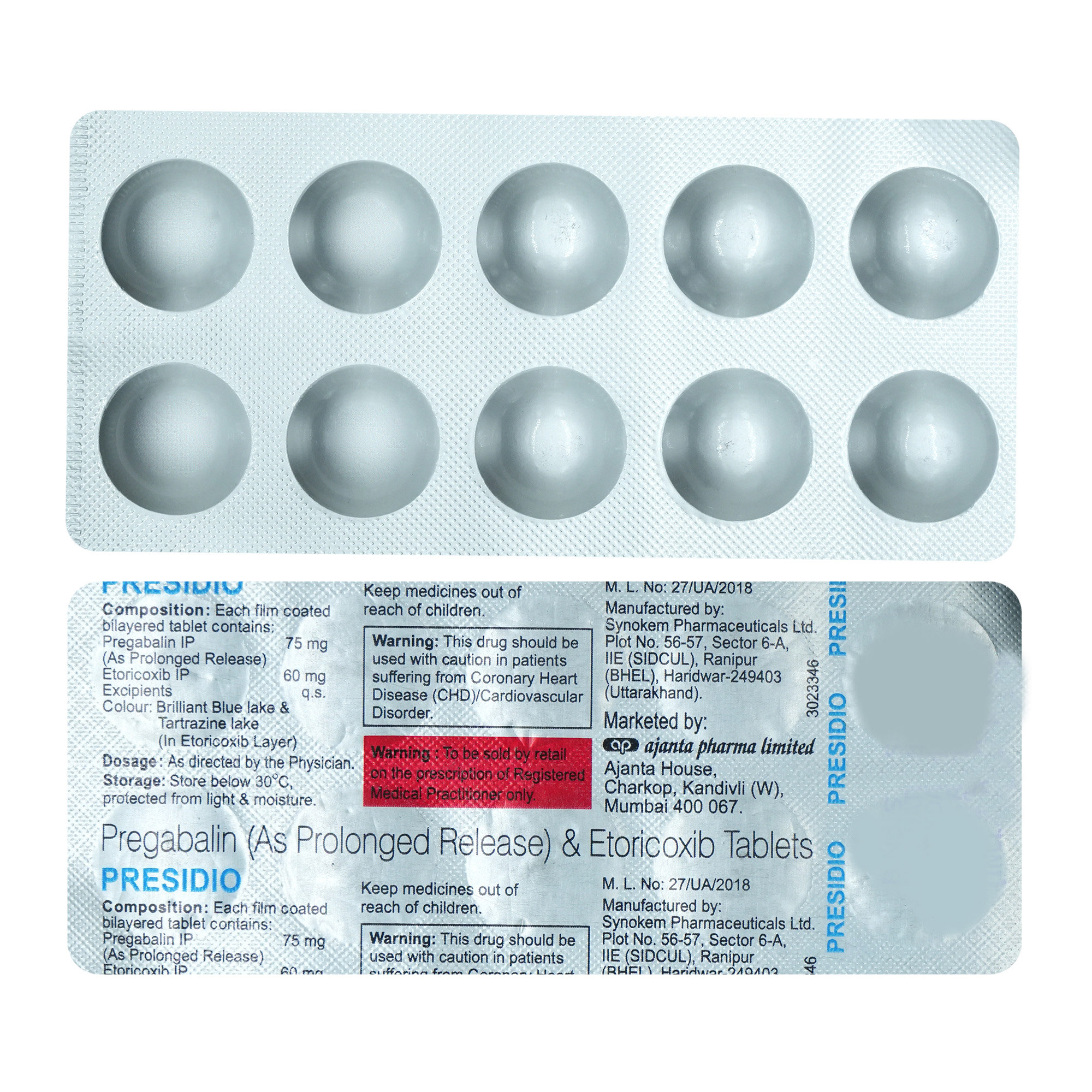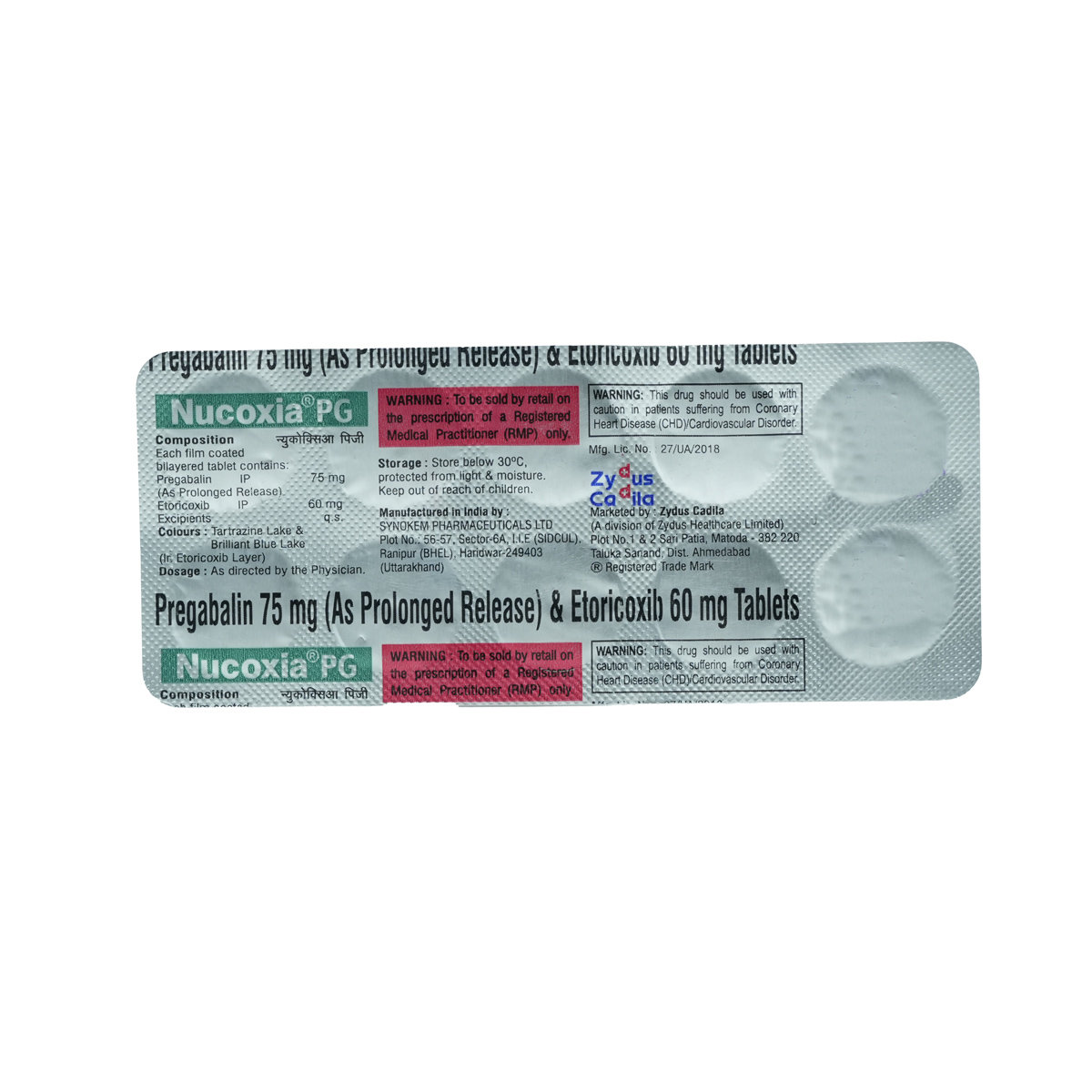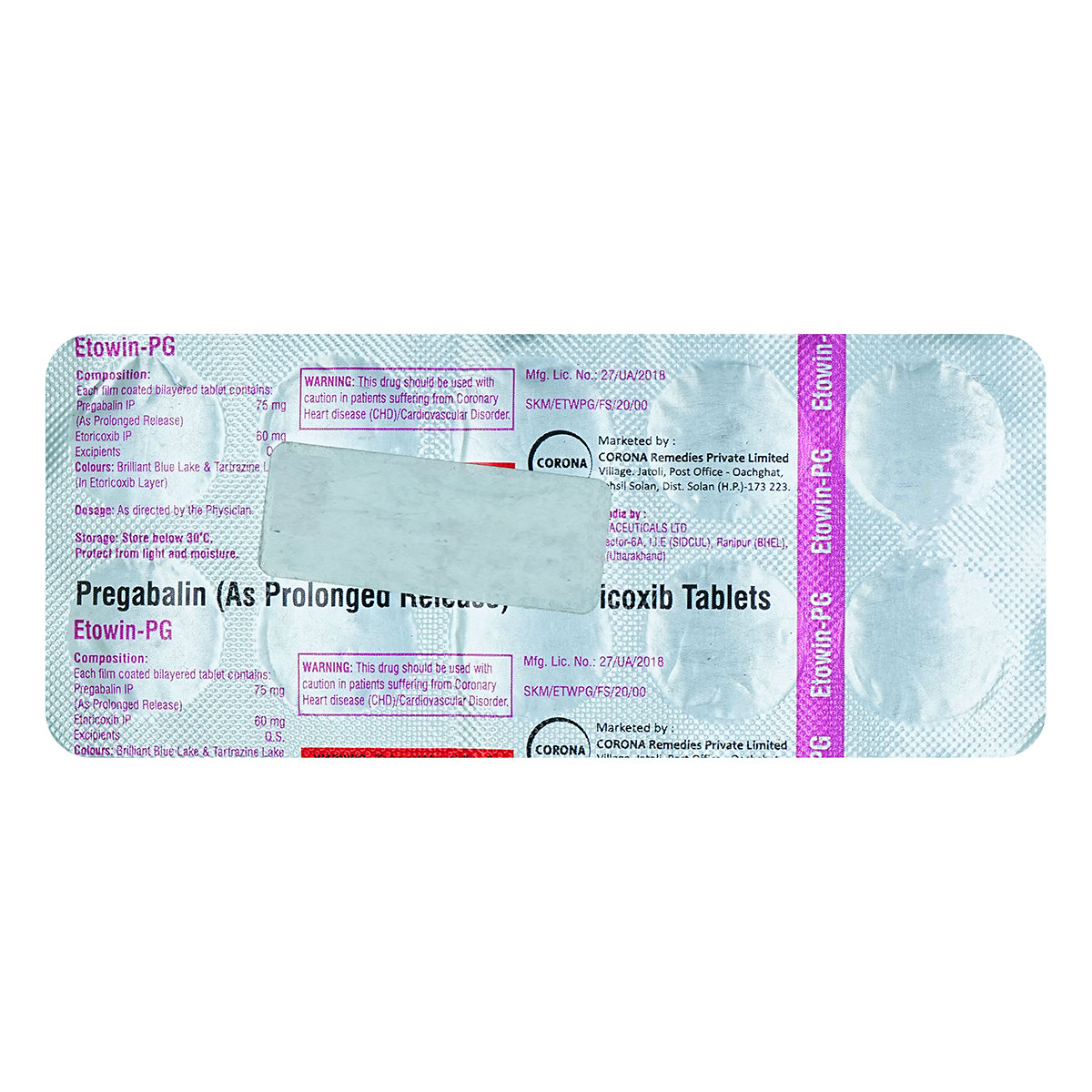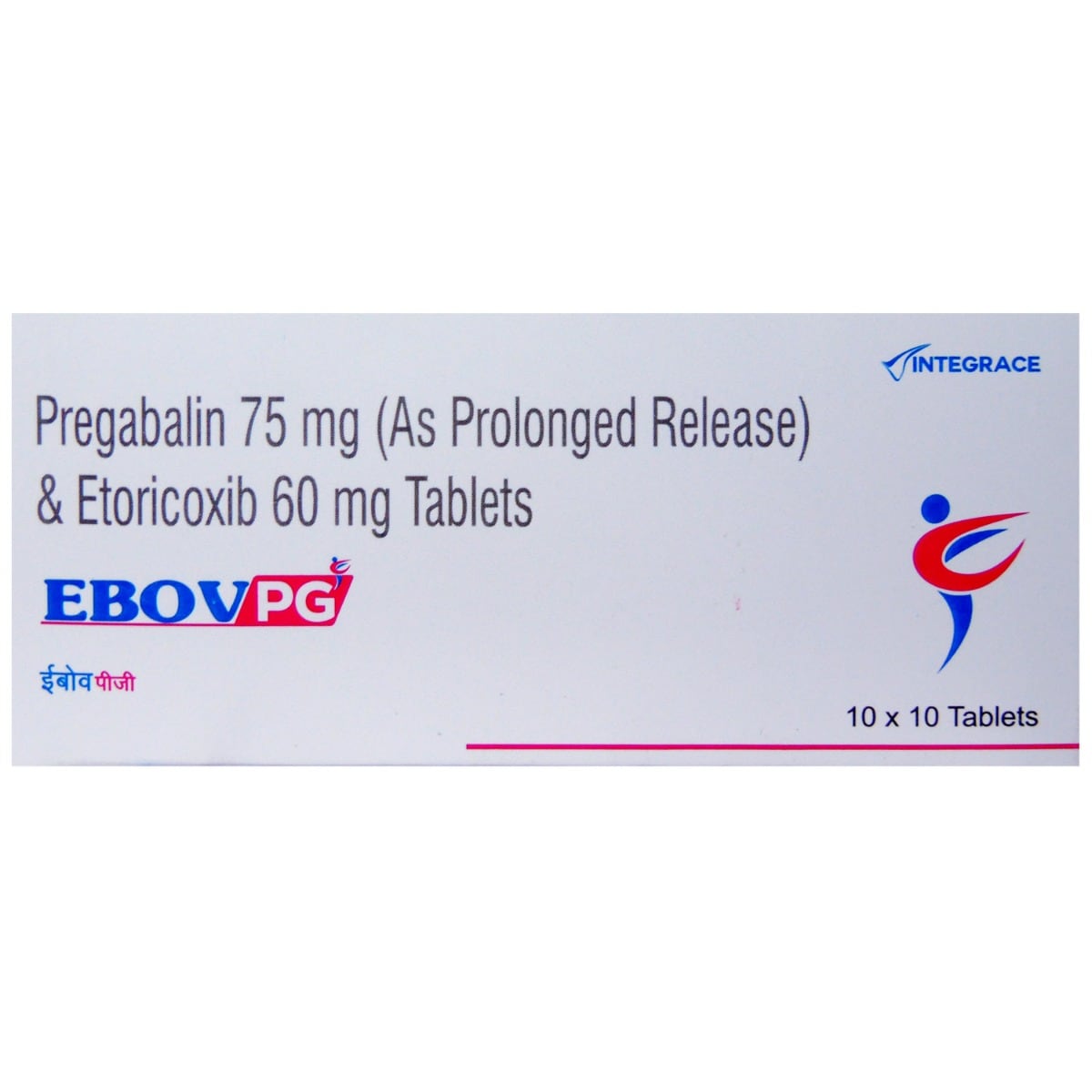Pgtus-ET Tablet 10's
MRP ₹168.5
(Inclusive of all Taxes)
₹25.3 Cashback (15%)
Provide Delivery Location
Online payment accepted
 Prescription drug
Prescription drugWhats That
Composition :
Manufacturer/Marketer :
Consume Type :
Expires on or after :
Return Policy :
About Pgtus-ET Tablet
Pgtus-ET Tablet is a combination medicine used to treat neuropathic pain associated with spinal cord injury or diabetic peripheral neuropathy. Also, it is used to treat fibromyalgia (widespread muscle pain and tenderness) and post-herpetic neuralgia (lasting pain in the areas of skin where you has shingles). Neuropathic pain is a chronic progressive nerve disease that causes nerve pain due to nerve damage or malfunctioning of the nervous system. A feeling of numbness and loss of sensation is also common with neuropathic pain.
Pgtus-ET Tablet is a combination of Etoricoxib (nonsteroidal anti-inflammatory drug) and Pregabalin (anticonvulsant). Etoricoxib works by blocking the release of certain chemical messengers in the brain responsible for causing pain and symptoms of inflammation, such as redness and swelling. Pregabalin affects the chemicals in the brain that send pain signals across the nervous system. It works by binding to the specific site on voltage-gated calcium channels; this helps in relieving nerve pain. Together, Pgtus-ET Tablet helps in providing relief from pain.
Take Pgtus-ET Tablet as prescribed. You are advised to take Pgtus-ET Tablet for as long as your doctor has prescribed it for you, depending on your medical condition. Sometimes, Pgtus-ET Tablet may cause common side effects such as dizziness, headache, swelling of ankles or feet, nausea, vomiting, dry mouth, or stomach pain. Most of these side effects do not require medical attention and will resolve gradually. However, you are advised to talk to your doctor if you experience these side effects persistently.
If you are allergic to Etoricoxib, Pregabalin or any of its contents, please tell your doctor. If you are pregnant or breastfeeding, inform your doctor before taking Pgtus-ET Tablet . Avoid driving or operating machinery if you feel dizzy or have blurred vision after taking Pgtus-ET Tablet . Avoid alcohol consumption with Pgtus-ET Tablet as it may increase the risk of liver damage.
Uses of Pgtus-ET Tablet
Directions for Use
Key Benefits
Pgtus-ET Tablet contains Etoricoxib and Pregabalin used to treat neuropathic pain associated with spinal cord injury or diabetic peripheral neuropathy. Also, it is used to treat fibromyalgia (widespread muscle pain and tenderness) and post-herpetic neuralgia (lasting pain in the areas of skin where you has shingles). Etoricoxib is a nonsteroidal anti-inflammatory drug (NSAID) that blocks the release of certain chemical messengers in the brain responsible for causing pain and symptoms of inflammation such as redness and swelling. Pregabalin is an anticonvulsant that affects the chemicals in the brain that send pain signals across the nervous system. Thus, it helps in relieving nerve pain. Together, Pgtus-ET Tablet helps in providing relief from pain.
Storage
Drug Warnings
If you are allergic to Etoricoxib, Pregabalin or any of its contents, please tell your doctor. If you are pregnant or breastfeeding, inform your doctor before taking Pgtus-ET Tablet . Avoid driving or operating machinery if you feel dizzy or have blurred vision after taking Pgtus-ET Tablet . Avoid alcohol consumption with Pgtus-ET Tablet as it may increase the risk of liver damage. If you have blurred vision or notice any changes in vision while taking Pgtus-ET Tablet , consult your doctor immediately. If you are receiving long-term therapy, your doctor may recommend regular blood tests to monitor your liver functioning.
Diet & Lifestyle Advise
- Include cayenne pepper in your diet, as it can help in lowering neuropathic pain.
- Exercising regularly helps in improving overall health and combating pain.
- Rest well, and get plenty of sleep.
- Try taking a warm bath, as it can be soothing.
- Avoid smoking and alcohol consumption.
- Meditation and yoga can help lower stress, decrease pain sensitivity and improve coping skills.
- Acupuncture can be helpful by stimulating pressure points.
- Using essential oils for massages can help increase circulation.
Side Effects of Pgtus-ET Tablet
- Dizziness
- Headache
- Swelling of ankles or feet
- Nausea
- Vomiting
- Dry mouth
- Stomach pain
Habit Forming
Therapeutic Class
All Substitutes & Brand Comparisons
RX
Out of StockNot for online saleAmocare 75mg/60mg Tablet SR
H Care India
₹80.3
(₹7.23 per unit)
52% CHEAPERRX
Out of StockNot for online salePregabid E Tablet 10's
Intas Pharmaceuticals Ltd
₹225
(₹20.25 per unit)
33% COSTLIERRX
Not for online saleBrutaflam PG Tablet 10's
Mankind Pharma Pvt Ltd
₹226.5
(₹20.39 per unit)
34% COSTLIER
Author Details
We provide you with authentic, trustworthy and relevant information
FAQs
Pgtus-ET Tablet contains Etoricoxib and Pregabalin. Etoricoxib works by blocking the release of certain chemical messengers in the brain responsible for causing pain and symptoms of inflammation, such as redness and swelling. Pregabalin affects the chemicals in the brain that send pain signals across the nervous system. It works by binding to the specific site on voltage-gated calcium channels; this helps in relieving nerve pain. Together, Pgtus-ET Tablet helps in providing relief from pain.
Pgtus-ET Tablet may cause blurred vision in some people. Therefore, avoid driving until your vision is clear. However, if you notice any changes in vision while taking Pgtus-ET Tablet , please consult a doctor immediately.
Pgtus-ET Tablet may cause dry mouth as a common side effect. To avoid such side effects, drink plenty of water, regularly rinse your mouth, practice good oral hygiene and suck on sugarless candy. However, if the condition persists or worsens, please consult your doctor.
Disease/Condition Glossary
Neuropathic pain: Neuropathic pain is caused by damaged sensory nerves. It is caused by persistent, progressive nerve illness, infection, or damage. The pain may be intermittent or constant, and it may feel like prickling, stabbing, tingling, or burning. Neuropathic pain is also characterized by numbness and loss of sensation. Normally, the body sends pain signals when there is an injury, but with neuropathic pain, the pain is not triggered by an injury; instead, the body transmits pain signals unpromptedly. Symptoms include unprovoked pain, unpleasant feelings, shooting, searing, or stabbing pain, difficulty resting or sleeping, and evoked pain (pain generated by events that are normally not uncomfortable).

Have a query?
Alcohol
Safe if prescribed
Avoid consumption of alcohol while taking Pgtus-ET Tablet as it may increase the risk of liver damage.
Pregnancy
Consult your doctor
Limited data available on the effect of Pgtus-ET Tablet in pregnancy. Hence, if you are pregnant or planning pregnancy, inform your doctor before taking Pgtus-ET Tablet . Your doctor may give this medicine if the benefits outweigh the risks.
Breast Feeding
Consult your doctor
Limited data available on the effect of Pgtus-ET Tablet on breastfeeding. Hence, if you are a nursing mother, inform your doctor before taking Pgtus-ET Tablet . Your doctor may give this medicine if the benefits outweigh the risks.
Driving
Safe if prescribed
Avoid driving or operating machinery if you feel dizzy or have blurred vision after taking Pgtus-ET Tablet .
Liver
Consult your doctor
If you have any liver disease, please inform your doctor before taking Pgtus-ET Tablet .
Kidney
Consult your doctor
If you have any kidney disease, please inform your doctor before taking Pgtus-ET Tablet .
Children
Safe if prescribed
Limited information is available. Therefore, please consult a doctor before giving Pgtus-ET Tablet to children.














